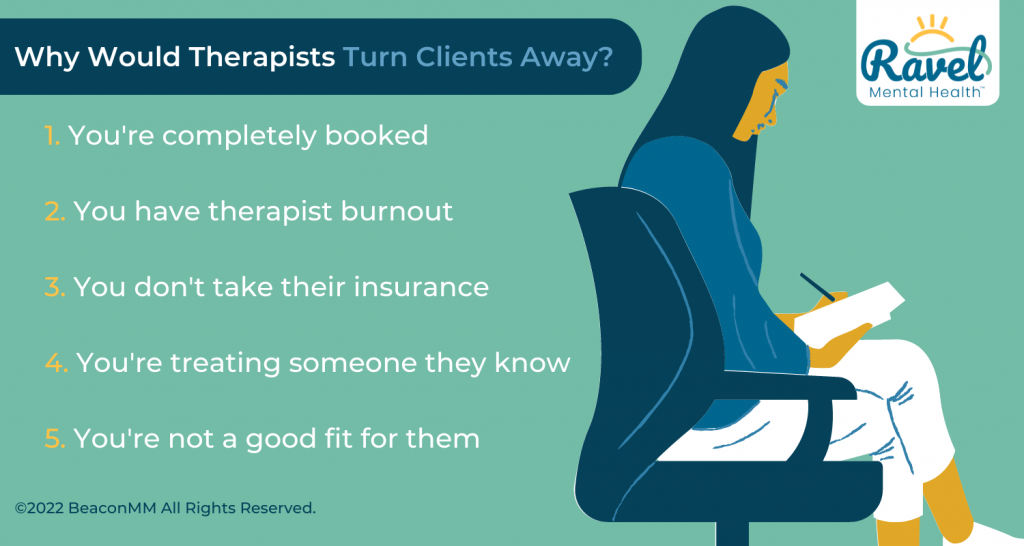Turning away a client may seem like a bad thing to do. You may feel some type of obligation to help as many people as you can. Knowing that someone is struggling and reaching out for help can make it more challenging to turn them away.
However, turning away a client can benefit them and you in the long run. It avoids a potential mismatch that could negatively impact their therapy experience. And when that happens, they may feel less inclined to seek help again, which could worsen their mental health.
How do you know when it’s the right time to turn away a client? There are several valid reasons that you can have for not taking on a particular client. Here are common reasons why you might have to turn down someone seeking therapy and how to handle the situation.
Are you interested in connecting with the right clients? Sign up for Ravel Mental Health today to get started!
Why Would Therapists Turn Clients Away?

Although you want to help everyone, you may be unable to do so. Maybe the client doesn’t match your specialty and qualifications or maybe you cannot take on the workload. Turning away potential clients can benefit you and them, as it avoids client and therapist mismatches while making sure every client who reaches out to you gets the care they need.
Here are some of the most common reasons therapists turn clients away.
1. You’re Completely Booked
One major reason you may not take on a client is because of the workload you already have. You probably already see around five clients daily and it’s likely you feel exhausted by the end of the week.
You may also feel you’ve reached capacity for how many people you can take on. Being a therapist can be emotionally and mentally taxing when you’re helping lift the emotional burden from someone’s shoulders. And on top of that, you’re always reading and researching to stay up to date and try to find the best treatment options for them.
If your calendar is already full, you’ll have to turn them away, unless you’re ready to take on that extra workload. However, it’s an essential part of the process, because it ensures that you able to give your existing clients the attention, care, and level of services they need.
It also means the person seeking therapy gets a chance to find a therapist with the time and capacity to take on their specific needs. It also allows them to find a therapist who may have better flexibility to fit their schedule, or even adjust the type of service they receive to suit, such as online therapy.
2. You Have Therapist Burnout
Like any job, therapists burn out from time to time. It can be difficult to find the right work-life balance. Burnout is common for many jobs, as people can take on too much work and begin to feel unmotivated and uninspired to do what they once loved.
Therapist burnout can be challenging as it often leads to symptoms such as compassion fatigue, which is when exhaustion makes it difficult to empathize with others. This can make it harder to want to treat your patients and come up with better treatment methods that best suit their needs.
If you’re experiencing burnout, it’s not the best time to take on new clients as you may not be able to provide them with the best quality of care. Even if you theoretically want to take on more clients to build your business, therapist burnout may create barriers that prevent you from doing so– for example, decreased motivation.
Self-care can be a powerful tool to overcome therapist burnout and get back on track.
3. You Don’t Take Their Insurance
For clients, finding a therapist that will take their insurance can be a crucial factor in which therapist they choose. Since therapy can be expensive, it may not be accessible to all, even if they need help. Although tools such as sliding-scale fees can help, they may not make as big of an impact as insurance would. You may need to help them make the right decision.
If you don’t take their insurance, talk with the potential client. They may not know, or they could be willing to see you without insurance coverage. Depending on how you run your practice, if they don’t have insurance that you take, it could be a reason to turn them away to ensure they get the best outcomes mentally and financially.
Are you interested in connecting with more clients? Sign up for Ravel Mental Health so clients that fit your specialty can find you!
4. You’re Treating Someone They Know
Although you may have a few clients who have connected with you based on recommendations, that may not always be the best reason to take on a client. Some clients may have interconnected lives that could create a conflict of interest, making it hard for you to treat each person individually without influence from the other.
If you’re already treating someone close to the potential new person, you may feel awkward offering them therapy sessions. This valid reason for turning someone away and recommending them to another treatment provider. This can help avoid any situation in which you become a kind of uncomfortable middle man.
5. You’re Not a Good Fit
One of the most common reasons therapists turn clients away is if they’re not a good fit. Several factors can make someone not a good fit for your practice.
They may know that they have problems but may not know if your specialty is what they need. If they need specific therapy that you don’t provide, that can be a reason to recommend them to another therapist better suited for them. So, turning them away and trying to find someone better suited for them can educate them and lead them to a therapist who can help.
Another reason could be that you don’t feel like their personality is a good fit for you. You may feel uncomfortable around them, making it difficult for you to treat them or open up to you. If you don’t connect with them, it’s best to turn them away so they can find a therapist who does.
How to Turn a Client Away
Turning away a client can benefit you and them, but that may not mean that it’s easy to do so. It can be hard to tell someone that you can’t help them. They may feel hurt or unsure what to do next, so making sure you handle the situation correctly is crucial.
A good technique for turning away a client includes:
- Explaining why you are not a good fit for them
- Explaining who they can see instead and why they’re in a position to help
- Techniques they could do for self-care while connecting with another therapist
Using these methods when turning away a client can help them understand why you’re choosing to hand them off to another therapist. It also allows them to have a positive therapy experience that keeps them open to finding the right therapist.
How to Find the Right Clients
Of course, you can’t help everyone, but you can possibly help even more clients by finding solutions to free up more of your admin time. There are endless responsibilities between running your practice, seeing your clients, and trying to book appointments.
Ravel Mental Health is an online platform that can help you with your admin time and allow you to spend more time on your patients. This forum allows you to create a therapist profile that previews your specialties so clients can easily connect with you.
Clients can go onto the platform and easily book an appointment with you, and you can approve them with one click. This allows you to have more time and avoid playing phone tag. If you’re ready to connect with the right clients, you can use our platform to transform your therapy practice and avoid mismatches.
Are you ready to connect with the right people? Sign up for Ravel Mental Health today and start connecting with the right clients today!
